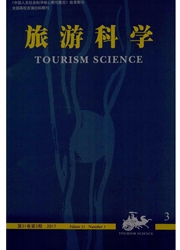

 中文摘要:
中文摘要:
乡村旅游地居民是社区参与的主体,社区参与是乡村旅游地可持续发展的重要前提,目前社区归属感对乡村旅游地居民社区参与的影响机制和路径研究较为薄弱。基于文献回顾,引入旅游获益中介变量,构建乡村旅游地居民的社区归属感——社区参与结构方程模型。以浙江安吉为例,通过实地问卷调查采集数据,探讨社区归属感对社区参与的影响机制及路径。研究表明:乡村旅游地居民社区归属感对旅游获益和社区参与均有显著正向影响,旅游获益是社区归属感影响社区参与的中介变量;社区归属感对社区参与既有直接效应又有间接效应,其直接效应(0.48)远远高于通过中介变量旅游获益对社区参与的间接效应(0.55×0.27);旅游地居民对个人职业与旅游业的关系的重视程度要高于家庭成员职业与旅游业的关系。最后提出了促进乡村旅游发展的若干建议和研究不足。
 英文摘要:
英文摘要:
Residents in rural tourist destination are major parts of community involvement which is an important prerequisite for sustainable development of rural tourist destination. Sense of community is one of positive factors to promote tourism community Involvement. But there are a few researches on this subject especially its impact mechanism and path. Based on a review of the literature and the introduction of variable of personal benefit from tourism, the paper constructed the structural equation model on sense of community-community Involvement in rural tourism destination. The study took Anji county in Zhejiang province as a case to explore the impact mechanism and path of sense of community on community involvement. The results showed that sense of community had significant positive effects on community involvement and personal benefit, and that personal benefit from tourism was a mediate variable of this influence. Influence of sense of community on community involvement had both direct effect and the indirect effect, and its direct effect (0.48) was much higher than the indirect effect (0. 55 ~ 0.27 ) through the mediate variable of personal benefit from tourism. Residents in rural tourist destination pay more attention to personal occupation and its relationship between the tourism industry than his/her members of the family occupation in relation to tourism. The article put forward some suggestions for promoting the development of rural tourism.
 同期刊论文项目
同期刊论文项目
 同项目期刊论文
同项目期刊论文
 期刊信息
期刊信息
